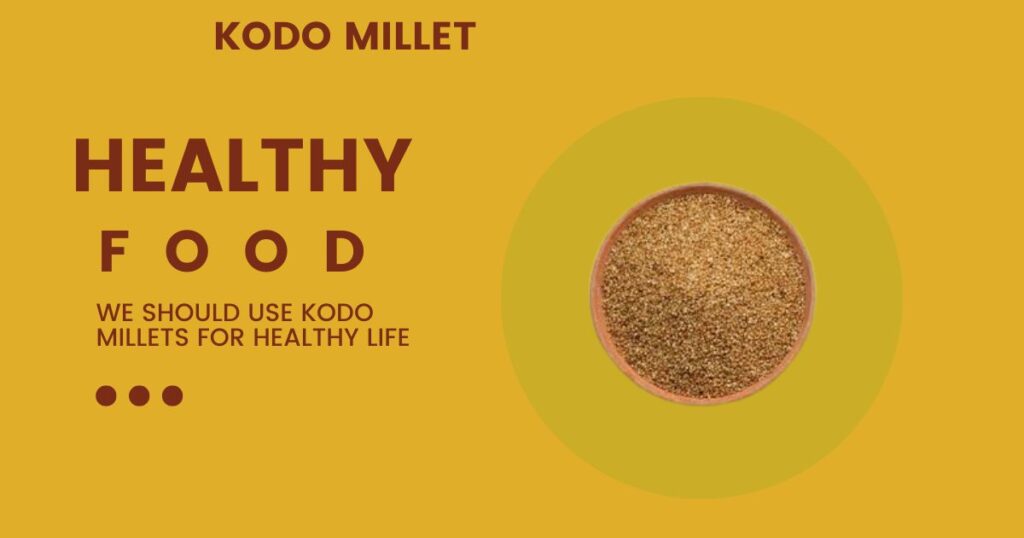Kodo millets, often overshadowed by more commonly known grains, are a powerhouse of nutrition and a boon for health-conscious individuals. With their rich nutritional profile, health benefits, and environmental advantages, Benefits of kodo millets these tiny grains are making a significant impact on diets around the world. In this comprehensive article, we explore the multitude of benefits that Kodo millets offer, from their role in traditional medicine to their contribution to sustainable agriculture.
Overview of Kodo Millets

Kodo millets, scientifically known as Paspalum scrobiculatum, are ancient grains that have been cultivated for thousands of years. Native to India, these millets have been a staple in the diets of rural communities due to their resilience and nutritional value. The resurgence of interest in traditional grains has brought Kodo millets into the spotlight, highlighting their importance Benefits of kodo millets in contemporary diets.
Historical Background of Kodo Millets
The history of Kodo millets is deeply intertwined with the agricultural practices of ancient civilizations. Cultivated primarily in the semi-arid regions of India, these millets were valued not only for their nutritional benefits but also for their ability to thrive in harsh conditions. Ancient texts and agricultural records indicate that Benefits of Kodo millets were a crucial part of the diet for many communities, providing sustenance during periods of drought and food scarcity.
Nutritional Profile of Kodo Millets per 100 gm
| Energy (Kcal) | 302 |
| Protein | 8.03 g |
| Carbohydrate | 69.9 g |
| Crude Fiber | 69.9 g |
| Calcium | 22.0mg |
| Iron | 9.9mg |
Micro nutrients Composition
Kodo millets are a rich source of carbohydrates, providing sustained energy release throughout the day. Unlike refined grains, Kodo millets retain their fiber content, aiding in digestion and maintaining stable blood sugar levels. They also contain a moderate amount of protein, making them an excellent addition to Benefits of kodo millets vegetarian and vegan diets.
Micro nutrients Richness
In addition to macronutrients, Kodo millets are packed with essential micronutrients. They are particularly high in B vitamins, such as niacin, riboflavin, and folic acid, which are vital for energy metabolism and neurological health. Benefits of kodo millets also contain significant amounts of iron, calcium, and magnesium, contributing to bone health and overall well-being.
Comparison with Other Millets
When compared to other millets like foxtail and pearl millet, Kodo millets stand out due to their higher fiber content and superior nutritional profile. Their low glycemic index makes them an ideal choice for individuals managing diabetes and those looking to control their weight.
Health Benefits of Kodo Millets
Enhances Digestive Health
The high fiber content in Benefits of Kodo millets plays a crucial role in promoting digestive health. Dietary fiber adds bulk to the stool, facilitating regular bowel movements and preventing constipation. Additionally, fiber acts as a prebiotic, supporting the growth of beneficial gut bacteria and enhancing overall gut health.
Aids in Weight Management
Incorporating Kodo millets into your diet can be an effective strategy for weight management. The fiber and protein content help in keeping you full for longer periods, reducing the likelihood of overeating. Moreover, the low glycemic index of Benefits of Kodo millets ensures a slow and steady release of glucose into the bloodstream, preventing sudden spikes and crashes in blood sugar levels.
Low Glycemic Index Benefits
Kodo millets have a low glycemic index, making them an excellent choice for individuals with diabetes. Foods with a low glycemic index release glucose slowly into the bloodstream, helping to maintain stable blood sugar levels. This property of Benefits of kodo millets can aid in better blood sugar control and reduce the risk of type 2 diabetes.
Supports Heart Health
Benefits of kodo millets has been associated with improved heart health. They are rich in antioxidants, such as phenolic compounds, which help in reducing oxidative stress and inflammation. Additionally, the magnesium content in Kodo millets can help in regulating blood pressure, further contributing to cardiovascular health that is Benefits of kodo millets.
Anti-inflammatory Properties
Kodo millets possess anti-inflammatory properties that can help in reducing chronic inflammation, a root cause of many diseases. The presence of antioxidants and phenolic compounds in Kodo millets helps in neutralizing free radicals, thereby reducing inflammation and protecting against chronic diseases.
Boosts Immunity
Regular consumption of Kodo millets can boost your immune system. They are rich in essential vitamins and minerals, such as zinc, which play a crucial role in maintaining immune function. A strong immune system is essential for defending the body against infections and illnesses.
Improves Bone Health
Kodo millets are an excellent source of calcium and magnesium, both of which are essential for maintaining strong and healthy bones. Regular consumption of Kodo millets can help in preventing bone-related disorders such as osteoporosis and enhance overall bone density.
Beneficial for Diabetics
Due to their low glycemic index, Kodo millets are particularly beneficial for individuals with diabetes. They help in maintaining stable blood sugar levels and can be a part of a diabetic-friendly diet. The high fiber content also aids in better glycemic control and overall metabolic health.
Kodo Millets in Culinary Use
Traditional Recipes
Kodo millets have been a part of traditional recipes for centuries. They are commonly used in dishes such as porridge, flatbreads, and savory snacks. Traditional recipes not only preserve the cultural heritage but also highlight the versatility of Kodo millets in various culinary preparations.
Modern Recipes
With the growing popularity of healthy eating, Kodo millets are being incorporated into modern recipes. From salads to smoothies and stir-fries to desserts, Kodo millets can be used in a variety of contemporary dishes. Their nutty flavor and chewy texture add a unique twist to modern culinary creations.
Gluten-Free Baking with Kodo Millets
Kodo millets are naturally gluten-free, making them an excellent choice for gluten-sensitive individuals. They can be used in gluten-free baking to prepare bread, muffins, and cookies. Using Kodo millets in baking not only provides a nutritious alternative but also adds a distinct flavor and texture to baked goods.
Environmental Benefits of Kodo Millets
Sustainable Agriculture
Kodo millets contribute to sustainable agricultural practices. They require minimal inputs such as fertilizers and pesticides, making them an eco-friendly crop. Their cultivation helps in maintaining soil health and reducing the environmental impact of agriculture.
Low Water Requirement
One of the significant advantages of Kodo millets is their low water requirement. They can thrive in arid and semi-arid regions with minimal irrigation. This characteristic makes them an ideal crop for regions facing water scarcity and helps in conserving water resources.
Climate Resilience
Kodo millets are highly resilient to climatic changes. They can withstand extreme weather conditions such as drought and high temperatures, making them a reliable crop in the face of climate change. Their resilience ensures food security for communities dependent on agriculture.
Economic Impact of Kodo Millets
Supporting Local Farmers
The cultivation of Kodo millets provides economic benefits to local farmers. As a hardy crop, it requires fewer inputs and can be grown in marginal soils, offering a viable source of income for small-scale farmers. Promoting Kodo millets can help in improving the livelihoods of rural communities.
Market Demand and Trends
There is a growing market demand for Kodo millets due to their health benefits and nutritional value. Consumers are increasingly seeking out traditional and nutritious grains, leading to a surge in the popularity of Kodo millets. Market trends indicate a positive outlook for the demand and consumption of Kodo millets.
Related Post
**Cultivation of
